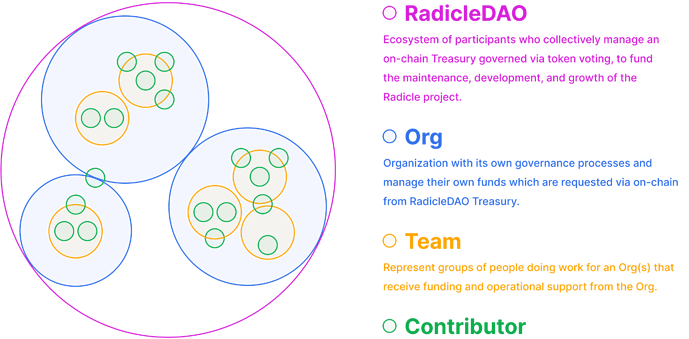Proposal Champions
Shelby Steidl - @shelb_ee | shelb_ee#9785
Abbey Titcomb - @abbey | abbey#5646
The official discussion for the Governance Improvements proposal. With this post, the proposal has entered the second phase of the governance process. Please review the drafted proposal and contribute feedback by Tuesday, February 28th.
Purpose
The following proposal is an overview of governance updates supporting the DAO’s adoption of a new ecosystem model. The proposed updates are made by the Community & Governance team and are based in learnings gathered throughout the last year of stewarding the DAO. These updates also aim to make it easier for RadicleDAO members to follow governance proposals, participate in governance, and understand the DAO’s ecosystem model.
Overview & Background
The Radicle project is on the journey of “transitioning to the DAO”. As part of this journey, the RadicleDAO is adopting a new ecosystem model (explained in Next Steps: Introducing the Core Development Org ), where teams & contributors organize themselves within independent Orgs. Each Org exhibits its own governance processes and manages its own funds. Orgs are funded through RadicleDAO and its treasury, meaning that they will need to maintain mission-alignment and create regular governance proposals to receive treasury funding.
Radicle Ecosystem Model
Implementation
Proposal Actions:
- Merge: add governance manual v2 by abbey-titcomb · Pull Request #2 · radicle-dev/radicle-governance · GitHub
- Merge: add contributing.md by abbey-titcomb · Pull Request #3 · radicle-dev/radicle-governance · GitHub
- Merge: add proposal templates by abbey-titcomb · Pull Request #4 · radicle-dev/radicle-governance · GitHub
The two major additions to Radicle’s off-chain governance process are the Governance Manual and Proposal Directory/Template Library. These two governance resources introduce an assortment of updates that we believe will make governance of the RadicleDAO cleaner, simpler, and more effective.
Governance Manual
Up until now, Radicle’s governance process has lived on community.radworks.org (see here) and is maintained by the Radicle Foundation’s Governance Team contributors. With the introduction of the Governance Manual, the governance process can be managed by the RadicleDAO. Radicle’s Governance Manual will be a living document outlining all processes, cycles, and rules related to governance of the RadicleDAO and its Treasury. This Governance Manual will live in a version-controlled repository (radicle-dev/radicle-governance) and can only be updated through a formal off-chain vote (see contributing.md).
The Governance Manual presents some changes to to Radicle’s on-chain and off-chain governance processes. These changes are being introduced by the Community & Governance Team based on learnings taken from facilitating governance over the last year.
These updates include the:
- Removal of the Temperature Check step from the Governance Process
- In theory, Temperature Checks are meant to be informal discussions around an initial idea or question, with the goal of developing a potential proposal. Yet in practice, we found proposers submitting detailed proposal drafts, typically expected in the Discussion step. While Temperature Checks will remain as an informal label for discussions on the forum, it is removed as a required step in the governance process.
- Introduction of a formal proposal numbering scheme and proposal types: executable, social, consensus (e.g.
[Executeable][RGP - #] - [PROPOSAL TITLE])- This will make keeping track of proposals a lot easier for contributors. The numbering of proposals throughout their journey of the governance process will make it easier to keep track of multiple active proposals at one time rather than remembering the name. The explicit mention of the proposal type in the proposal title will allow voters to know if the proposals requires an on-chain action or just needs off-chain social consensus. You can find definitions and examples of all proposal types in the Proposal Directory & Template Library (currently PR#4 )
- Introduction of monthly proposal cycles
- Monthly cycles will sync voting periods and establish a manageable cadence for governance participants. It will also make the proposal process more straight forward and reliable for proposal authors. We understand that emergencies may come up and will not fit in these cycles. There will be a process for emergency proposal requests.
- Transition of governance process from Discourse to GitHub (see contributing.md)
- Version-controlled documentation of the governance process will be crucial to track and learn from changes over time. We also have included a clear process for updating the governance process, which had not existed before.
The full description of proposed changes can be found in PR#2.
Proposal Directory & Template Library
See PR#4
A new library of proposal templates will make it easier for community members to draft and post proposals. The directory helps folks better determine where proposals should be posted within the DAO based on their goals & objectives.
The Proposal Directory & Template Library provides contributors with a set of templates that can be used to create proposals to the RadicleDAO and its various Orgs.
Reasoning & Analysis
We believe that these governance updates will greatly improve the way the RadicleDAO is governed. The Governance Manual and Proposal Template Library introduce updates that will make it easier to participate in the RadicleDAO, which we believe will support the long-term stewardship of a self-sustaining, freely accessible, open-source ecosystem.
Open Questions
- Are the proposal types (executable, social, consensus) clear to everyone?
- Is a monthly voting cycle a good cadence for our project?
- What other updates do we want to make to governance in addition to this proposal? Some ideas are:
- Governance module upgrades like Compound Governor Bravo or OpenZeppelin Governor
- Quorum changes: Change to different participation %, make quorum based on # of voters rather than number of tokens, other?
- Private voting: Different tools to hide individual votes, revealing only collective end result
- Do token holders still find the Active Delegate Platform beneficial? Do we want to keep the Active Delegate Platform or rely on the delegate profiles on Boardroom or Tally?
